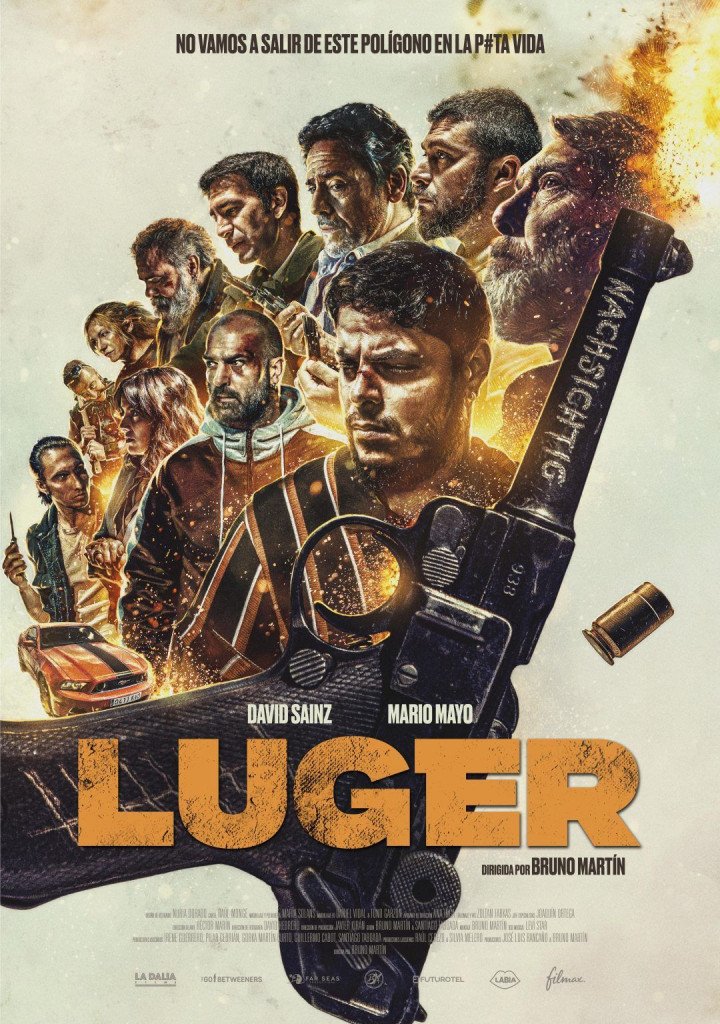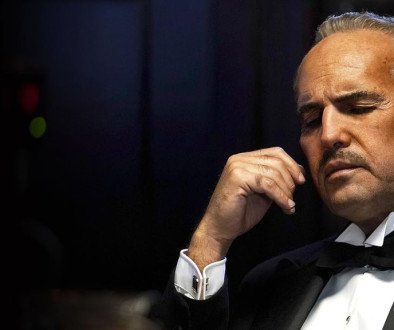Fantastic Fest XX Review: In LUGER, We’re Still Winning The War On Nazis!
Spanish thriller Luger is far from a war movie, but I love the context it brings to its current tale, along with some of its visual aesthetics clearly attributed to a nostalgic sensibilities. To add, its plot tooling and references extend to a far greater scope of the world and the generational impact war has in our collective daily struggles toward liberation.
Bruno Martín’s latest directorial effort culminates these in a crackling crime thriller whose first characteristic is Levi Star’s music which immediately percolates things. We then meet Rafa (David Sainz) and Toni (Mario Mayo), a pair of freelance fixers who solve problems – albeit their way – for a price. Their latest client is Juan (Ángel Acero), a man whose missing car ends up being the first step into a dark, dissenting tale that finds our two tough guys tussling with a seedy, grisled junkyard owner named Santamano (Ramiro Alonzo), and his squad of goons when a safe stashed in the car, and its prized possession – a Luger P08 pistol – go missing.
What follows is a race against time with Toni, beaten and held hostage until Rafa, accompanied by a pair of Santamano’s adjutants or otherwise, can retrieve the gun. The real question that arises, beyond who is screwing over who in the thick of things of this sordid tale of glutton, betrayal and uneasy redemption, pertains to the pistol’s decades-old origins, leading up to climax that absolutely seethes with catharsis.
The film’s plot is anchored further by the underlying friction between Rafa and Toni. Rafa, hailing from the Canary Islands, is as perceptive as it gets. He’s inquisitive and observes things with little need to act before knowing what to do, but his life in Madrid is only a means to an end. He’s got eyes on helping his family’s hostel or a possible escape to Australia.
Either way, he wants out, or what he so deems as “a second chance,” whereas Toni, who for all intents and purposes acts as the muscle of the two, has his own mind about things on the contrary. He has more to lose between his fealty to his father and to Rafa, which also stems as an aspect to the two years he served in prison at one point.

There are various pieces to the story in Luger that aren’t presented physically, but are implied and proffered throughout to give viewers a crisp and vivid look at what’s at stake before things start to boil over and get a little more bloody. The big picture angle, however, stems from the film’s McGuffin, which makes this film’s climax all the more sweeter and vindicating.
Written by Martín and co-scribe Santiago Taboada, Luger comes packaged with an edgy, intense crime flick that keeps moving no matter the pace or tone. You have only an idea of what could happen next until what actually happens, and all the cards are eventually put on the table. Coupled with a few history addendums along the way, Martín proffers an inclusive profile on the generational impact of war, and the choices we make along the way.
The action in Luger is a thrill to watch, with stunt sequences coordinated by Joaquín Ortega. Mayo, last covered on our radar with Kike Narcea’s I’ll Crush Y’all, which scored several Best Actor wins last year, is at the forefront of the action. That his character nearly gets taken out of commission in the first half of the film reaffirms the challenge it faces to keep its energy going, and to say the least, Martín, who also gets a co-starring gig in his debut feature, doesn’t disappoint.
Luger is a smartly-written and delivered crime story that runs high on adrenaline at all the right times. Sainz and Mayo are amazing on screen and with an insightful plot with a spotlight on world history, a cohesive script that keeps you on your toes, action that hits hard, and ideas that hit harder than any fist, or bullet. In today’s age, a film like this one a still gives me hope.
Luger enjoyed its World Premiere at the twentieth edition of Fantastic Fest.
Native New Yorker. Been writing for a long time now, and I enjoy what I do. Be nice to me!






LUGER: Catch The Trailer For Bruno Martin’s Crackling Crime Thriller Debut! - Film Combat Syndicate
October 8, 2025 @ 2:31 pm
[…] welcome to have a read of my review from its World Premiere at Fantastic Fest by tapping here. Beyond that, Sitges 2025 kicks off on Friday where Luger will screen on two seperate dates the […]